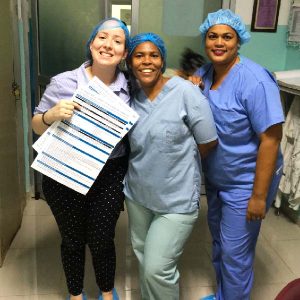Estefanía Henríquez Luthje is a first-year graduate student in our Master of Public Health (MPH) in Maternal & Child Health degree program. Estefanía's mission is to apply what she learns at SPH to her community in the Dominican Republic. Learn more about Estefanía by reading her responses to the questions below.
First, we’d like to know a little bit about you as a person. Where did you grow up? Where did you attend undergrad and what was your degree/area of study? [Estefanía] I was born in the Dominican Republic and have lived here all my life. An undergraduate degree isn’t required to go to medical school, so I enrolled at the Instituto Tecnológico de Santo Domingo (INTEC) right after high school. I completed my degree from INTEC in 2020, and received a certificate in clinical research at the Harvard T.H. Chan School of Public Health.

How did you become interested in public health? [Estefanía] There was not a specific moment that compelled me to pursue public health — the decision took a lot of reflection. During medical school, I took some courses that exposed me to public health. I liked the idea of helping people their entire lives as opposed to just trying to “fix” ailments as they come. I initially decided to become a pediatrician, and when I started doing research on maternal health, I felt like it was the first time I really loved what I was doing. I volunteered at the Dominican Foundation for Mothers & Infants, and the president of that foundation asked me to coordinate an educational program for maternal and neonatal nurses in the Eastern region. From there, I decided to invest more into my work with the community, focusing on maternal and child health.
What specific public health focus do you care the most about and why? [Estefanía] I chose to focus on maternal and child health because we have all been babies, and as such, I think we can all agree that babies should be guaranteed a healthy start to life. If we put more effort into making sure people have healthy pregnancies and a healthy childhood, it could have a significantly positive effect later in life. I also think the decision to focus on maternal and child health had something to do with my personality. I am the type of person who likes fixing things immediately, but in clinical settings, you often have to fix things at the last second instead of addressing the root cause. It can be very exhausting, which is why I want to help people as early as possible.
Are you currently involved in any public health research or professional work? [Estefanía] I am a research analyst with the Ministry of Public Health, where I have worked in a nutritional surveillance program for pregnant people and children under the age of five. I have been doing a lot of group work — engaging people on social media, at events, and at health fairs — and it has been great. I have learned a lot about malnutrition, micronutrient supplementation, food guidelines and food systems, and how all of these concepts impact health.
Why did you choose to come to the U of M School of Public Health? [Estefanía] I have been in contact with a lot of people who received their graduate degrees from the U.S., and that made me interested in learning about different programs. I noticed that the U of M School of Public Health’s (SPH) program on maternal and child health was very recognized and established. What solidified my decision was learning about the school’s work in the Dominican Republic, led by Associate Professor Zobeida Bonilla, specifically with Batey Relief Alliance’s project on women empowerment. SPH has been evaluating the effectiveness of that project, and I fell in love with the program ever since.
What are the reasons why you chose your program? What do you like about it? [Estefanía] I was recently named a Fulbright Scholar, and decided to attend the U of M School of Public Health for that program. The process took over a year, and when I was interviewed about the placement options, I knew that SPH was where I wanted to go. The Center for Leadership Education in Maternal & Child Public Health at SPH is one of the oldest in the country, and I am really looking forward to learning from experts who have helped shape this field for decades.
What are you most excited about in the school’s Strategic Plan for Antiracism? [Estefanía] I am excited to be in a learning environment that promotes antiracism everyday. I have fundamental knowledge on diversity, equity, and inclusion, but it is difficult to incorporate those principles into my work without the support of others around me. Fundamental human rights have been politicized and are being taken away. Many celebrate these violations. As a healthcare professional, I understand that going against these notions could cost me professional opportunities and relationships. So I am happy to be going somewhere that will understand me, and I look forward to applying what I learn here to my work back home.
What is your vision for an antiracist school of public health? [Estefanía] I would really love to see diverse representation reflected in the students, staff, faculty, and leadership at SPH. I would also value opportunities to practice antiracism in my work, and I would hope that what I learn about antiracism inside the classroom could translate into how I hold myself accountable outside of the classroom.

